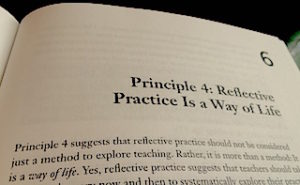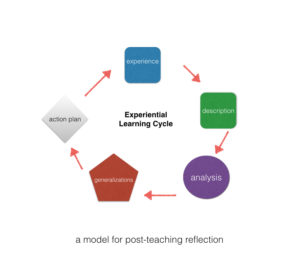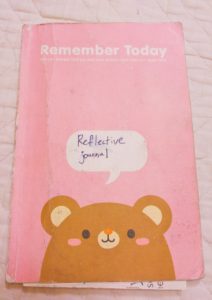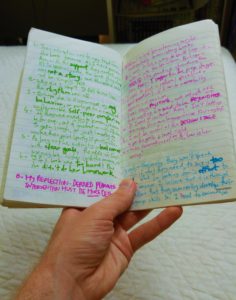 By Zhenya Polosatova
By Zhenya Polosatova
In preparation to writing this post I was re-reading ‘Reflective Teaching’ by Thomas S. C. Farrell. One of the four principles of reflection outlined by the author says: “Reflective Practice is a Way of Life.” The post below is my reflection on this principle.
 Reflective Practice is often associated with and is a part of Experiential Learning, or ‘learning by doing’. This approach emphasizes the importance of trying things out and learning from that experience. Interestingly, life itself can be seen as “the experience of being alive” if you check the definition in a dictionary.
Reflective Practice is often associated with and is a part of Experiential Learning, or ‘learning by doing’. This approach emphasizes the importance of trying things out and learning from that experience. Interestingly, life itself can be seen as “the experience of being alive” if you check the definition in a dictionary.
Reflective Practice is evidence-based, which means you need information, data, or facts before you start exploring something in detail. In teaching, it is information about observing (specific) student learning, progress, challenges, etc. In non-teaching (or real world), it might be data about our habits and lifestyle (what we eat, drink, how we spend money or time), about our communication patterns, thinking patterns… about anything, really. Anything we can call “our personal experience” and would like to examine or improve.
Reflection on teaching helps to review one’s professional beliefs and values and, in this way, shape and develop a unique teaching style or manner. Exploring beliefs often starts with some curiosity, with a “Why?” question: Why am I doing what I am doing? Where does this idea come from? Is there a different way? By asking these questions, a reflective teacher stays curious, alert, interested, and aware. In other words, the result of systematic reflection is less professional burnout and more job satisfaction, not to mention lots of student learning.
Reflection on teaching could be seen as a conversation, a dialogue with oneself, with colleagues, etc. In fact, if you actually ‘listen’ to the thinking in your mind, you will see that it is always a dialogue, or almost always. In this case, systematic, deliberate reflective practice simply uses what our thinking is naturally inclined to do.
After reading my mini promo speech about the benefits of Reflective Practice, you might have a logical question: How do you reflect? My own short answer is this: I use slightly adapted Experiential Learning Cycle (ELC) to structure my reflective process (readers can get more detailed information about ELC in my blog post ELC or the Art of Experiential Learning).
I first learned this idea on my trainer training program with School for International Training (now SIT Graduate Institute). It was the summer of 2006, which means that I have been using, adapting, experimenting and enjoying reflecting though the ELC for the last 10 years! In simple words, the Cycle helps to structure teacher reflection process by inviting them to go through several concrete steps, or stages: selecting a specific part of the lesson (or experience) to reflect on; describing it in as much detail as possible; analyzing possible ways in which it might have been (un)helpful for the student learning; stating generalizations, or conclusions, insights and a-ha moments about learning/teaching based on this experience; outlining your plan of actions that you are intended to try inspired by this reflection process. In other words, the reflective cycle will help you formulate a new ‘hypothesis’ about teaching/learning that you will be able to test, confirm, modify, and then bring it through the cycle again and again…
 I like the simplicity of this model: it never takes too long to explain or demonstrate to readers, teachers on a training course, or colleagues. What I find interesting about seemingly simple things in life is that applying them in practice takes much more time and effort than learning the theory. For example, have you ever tried describing an event, to the tiniest detail, without adding your own feelings to what actually happened, without expressing your opinion or attitude to it? If you have done so before, you know how hard it might be not to switch into interpreting what happened rather than simply describing it. If you have not, select a moment of a lesson that stands out to you, describe it in writing (or audio record yourself), then take a look and see if this was a description or… not.
I like the simplicity of this model: it never takes too long to explain or demonstrate to readers, teachers on a training course, or colleagues. What I find interesting about seemingly simple things in life is that applying them in practice takes much more time and effort than learning the theory. For example, have you ever tried describing an event, to the tiniest detail, without adding your own feelings to what actually happened, without expressing your opinion or attitude to it? If you have done so before, you know how hard it might be not to switch into interpreting what happened rather than simply describing it. If you have not, select a moment of a lesson that stands out to you, describe it in writing (or audio record yourself), then take a look and see if this was a description or… not.
Another challenge teachers sometimes face is spending time on analyzing that situation/experience in a balanced way, listing multiple ways of how this particular ‘event’ influenced the others, or the outcome of the lesson. Jumping to generalizations is so much more comfortable! The danger here lies in reducing the process of reflection to a self-talk along these lines: “the lesson was terrible, that’s probably because of that [activity] which I will never use again”… or even worse, “it did not work because we should give clear instructions…”
I do believe that reflective practice is a way of life. Once you started to use the reflective approach to your teaching and saw its benefits, how can you stop using it outside your classroom? At home, can you angrily tell your child (or husband, mother, etc.) “This is what you always do!” instead of patiently describing what happened and sharing why it troubled you? It might sound really strange but I received a lot of feedback from my course participants on how they improved relationships in their families with the help of this approach, or how some other problems that had nothing to do with ELT were solved. This is usually not a goal of a teacher training course but could become an added value. By becoming more reflective in the classroom, you will start to be much more present with the students, observe them much closer, notice many more details which had been out of your ‘attention zone’ before and which you probably used to take for granted. You will eventually become much more present and aware in your everyday life, much more mindful, much happier.
Am I an expert in this reflective process? A guru? Am I perfect at it? Well… No. I am enjoying the learning, the new discoveries this approach brings. I use it for my training of new trainers programs, for the curriculum development projects I participate in, for the coaching and consultancy work I am doing. This process to me is a magic trick to keep loving what I am doing and, hopefully, to become a little better as a professional and as a human.



 By Stewart Gray
By Stewart Gray









